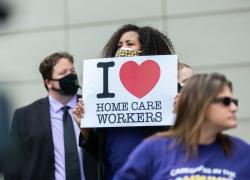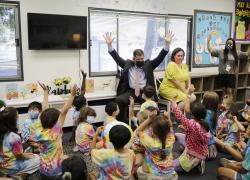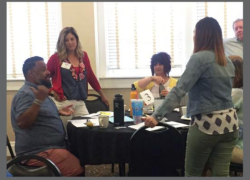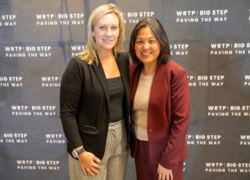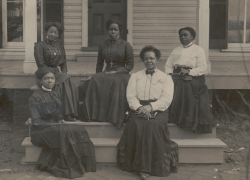In June, Secretary of Labor Marty Walsh hosted a virtual roundtable on the care economy featuring an economist and business leaders, including Jessica Derby, the child care program manager at Patagonia. We asked Jessica (center, standing) to share more of her thoughts on child care and what kind of care investments are needed to support communities and families across the nation.

What has your career path been like up to this point?
I got my start working in early childhood education and child care facilities with various organizations. Since 2018 I've had the privilege of leading people and programs for Patagonia’s onsite child development center, Great Pacific CDC. Our mission and values are put into practice every day through our child development centers. Our teachers empower the children (ages 4 months to 9 years) to be stewards of the planet by instilling a love and respect for nature. Throughout the decades it’s been said that the best product coming out of Patagonia is the next generation, a generation that acts for a more just world, one where people and the planet are protected.
It's been an incredible journey so far, exhausting at times but I look forward to what awaits me!
How does your work support employee access to affordable child care? How have you seen access to childcare facilities benefit families?
The pandemic has put educators and caregiving in the headlines the past 18 months. It's shown the expanding gap when it comes to accessing affordable, quality childcare programs. The programs I've taught in or lead have been mostly employer-sponsored childcare centers. Having families intertwined with a child's day is imperative. A mother can breastfeed throughout her work day, a father can have lunch with his child, teachers and parents can meet frequently to support the child and family's growth at the center and at home. When employees have access to affordable onsite child care where the tuition is subsidized by the company, it can lead to more women in management, greater employee engagement, and healthier communities where children and families can thrive.
Eearly childhood educators should be seen as gifted, experienced professionals. Educators working at employer-sponsored childcare centers should enjoy the same benefits that are offered to employees in all divisions of the company (401K matching, tuition assistance, medical insurance, family leave, onsite child care), which is the case at Patagonia. As educators, we have the time and funding to participate in professional development and training. Patagonia has also been focused on closing the pay parity between early childhood teachers and K-12 teachers. As a result, we have extremely low turnover. When teachers are compensated and supported they are able to successfully navigate the ever-changing needs of the diverse working families in their care.
How have you seen a lack of access to child care and/or early childhood education impact working families?
Being in the field for 20+ years I've seen the need for affordable quality child care grow each year. It can take years to get into an early education or preschool setting, which can cause anxiety from the moment of conception. I've been the first to know a family is expecting before blood relatives. Tuition for quality child care can be as much as a monthly rent or mortgage payment, which means many families have to compromise on the level of care or facility they place their child in, or a parent (usually the mother) has to leave the workforce, putting her career aside to care for her child(ren).
What about this issue – access to child care and the care economy in general – stands out to you personally?
All families should have access to equitable learning opportunities for their children; ones that help them achieve their full potential as engaged learners and valuable members of society. Private employers can’t do this alone ‒ we need a serious investment in children, families and educators. An investment in our field would mean more students would choose to study child development and see it as a long-term career, and that teachers won’t have to work side jobs just to pay their rent or feed their families. An investment in our field would benefit children and their families, as research shows that access to high-quality child care has a positive and lasting impact far beyond their time with us. Federal policies and investments must continue to include key stakeholders such as teachers, caregivers, parents, children and community leaders. My hope is that by being a part of this discussion, I can help inspire others to take action for our field, for the children, their families and our nation. Let’s put aside our old assumptions and reimagine what early childhood education and supporting families can be.

 U.S. Department of Labor Blog
U.S. Department of Labor Blog
